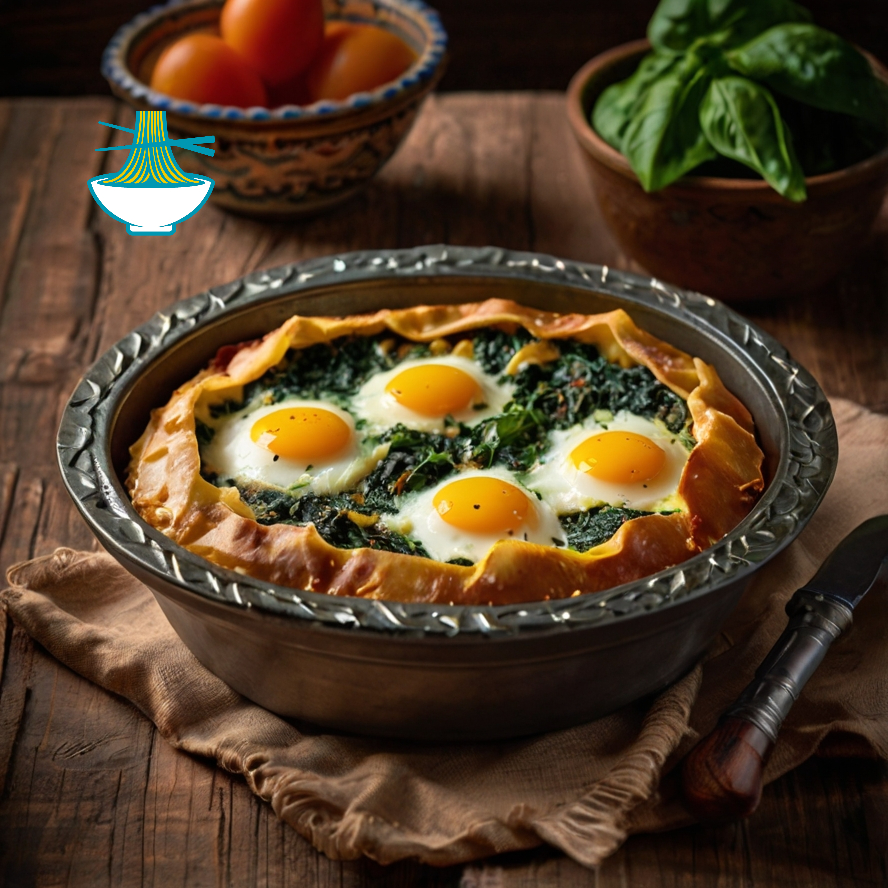Tagine Malsouka is a traditional Tunisian dish featuring layers of thin pastry filled with eggs, meat, cheese, and spinach, baked to perfection. Originating from Tunisia, it reflects the rich culinary heritage of North Africa, known for its flavorful and aromatic dishes influenced by Mediterranean, Arab, and Berber cuisines. The recipe showcases a harmonious blend of savory ingredients, offering a delightful taste experience that has been enjoyed for generations.
Ingredients:
- Thin pastry sheets
- Eggs
- Ground meat (such as beef or lamb)
- Cheese (such as feta or mozzarella)
- Spinach
- Olive oil
- Salt
- Pepper
- Optional: onions, garlic, herbs for seasoning
Method:
1. Preheat your oven to the recommended temperature.
2. In a skillet, cook the ground meat with onions, garlic, and seasoning until browned. Add spinach and cook until wilted. Set aside.
3. Grease a baking dish with olive oil and line it with pastry sheets, overlapping slightly to cover the bottom.
4. Spread a layer of the cooked meat and spinach mixture on top of the pastry.
5. Crack eggs over the meat and spinach layer, spacing them evenly.
6. Sprinkle cheese over the eggs and season with salt and pepper.
7. Repeat the layering process with remaining pastry sheets, meat mixture, eggs, and cheese.
8. Finish with a layer of pastry sheets on top.
9. Brush the top layer of pastry with olive oil.
10. Cover the baking dish with foil and bake in the preheated oven until the pastry is golden brown and the eggs are set.
11. Serve hot and enjoy your delicious Tagine Malsouka!
Nutrition Value:
1. Thin pastry sheets:
- Calories: Varies based on brand and type, generally around 50-100 calories per sheet.
- Carbohydrates: Typically around 10-20 grams per sheet.
- Protein: Low, usually 1-3 grams per sheet.
- Fat: Varies, usually 1-5 grams per sheet.
- Sodium: Minimal, typically less than 100 mg per sheet.
- Cholesterol: Typically low, less than 5 mg per sheet.
- Nutritional Benefit: Provides energy from carbohydrates, but limited in nutrients like protein and fiber.
2. Eggs:
- Calories: Approximately 70 calories per large egg.
- Carbohydrates: Very low, less than 1 gram per egg.
- Protein: High, around 6-7 grams per egg.
- Fat: Moderate, with about 5 grams of fat per egg.
- Sodium: Low, typically less than 70 mg per egg.
- Cholesterol: High, around 186 mg per egg.
- Nutritional Benefit: Excellent source of protein, vitamins (such as B12 and riboflavin), and minerals (such as selenium and choline).
3. Ground meat (beef or lamb):
- Calories: Varies based on lean/fat content, approximately 250-300 calories per 100 grams.
- Carbohydrates: Negligible.
- Protein: High, around 20-25 grams per 100 grams.
- Fat: Varies, usually higher in fat content, approximately 15-25 grams per 100 grams.
- Sodium: Varies based on seasoning, typically 50-100 mg per 100 grams.
- Cholesterol: Varies, approximately 70-90 mg per 100 grams.
- Nutritional Benefit: Excellent source of protein, iron, zinc, and vitamin B12, but can be high in saturated fats.
4. Cheese (feta or mozzarella):
- Calories: Varies based on type and serving size, approximately 70-100 calories per ounce.
- Carbohydrates: Very low, less than 1 gram per ounce.
- Protein: Moderate, around 6-7 grams per ounce.
- Fat: Moderate to high, approximately 5-8 grams per ounce.
- Sodium: Varies, typically 100-200 mg per ounce.
- Cholesterol: Varies, approximately 15-30 mg per ounce.
- Nutritional Benefit: Good source of calcium, protein, and phosphorus, but can be high in saturated fats and sodium.
5. Spinach:
- Calories: Very low, approximately 7 calories per cup (30 grams).
- Carbohydrates: Low, around 1 gram per cup.
- Protein: Low, approximately 1 gram per cup.
- Fat: Very low, less than 0.5 grams per cup.
- Sodium: Low, typically less than 25 mg per cup.
- Cholesterol: None.
- Nutritional Benefit: High in vitamins (such as A, C, and K), minerals (such as iron and magnesium), and antioxidants.
6. Olive oil:
- Calories: High, approximately 120 calories per tablespoon.
- Carbohydrates: None.
- Protein: None.
- Fat: High, approximately 14 grams per tablespoon, primarily monounsaturated fats.
- Sodium: None.
- Cholesterol: None.
- Nutritional Benefit: Rich in monounsaturated fats, which are heart-healthy, and contains antioxidants like vitamin E.
7. Salt:
- Calories: None.
- Carbohydrates: None.
- Protein: None.
- Fat: None.
- Sodium: High, approximately 2300 mg per teaspoon.
- Cholesterol: None.
- Nutritional Benefit: Provides flavor enhancement, but excessive intake can contribute to high blood pressure and other health issues.
8. Pepper:
- Calories: Negligible.
- Carbohydrates: Negligible.
- Protein: Negligible.
- Fat: Negligible.
- Sodium: Negligible.
- Cholesterol: None.
- Nutritional Benefit: Contains antioxidants like vitamin C and may have anti-inflammatory properties.


Comments